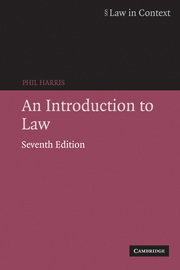Book contents
- Frontmatter
- Contents
- Preface
- Table of statutes
- Table of cases
- 1 Law and society
- 2 Law and morality
- 3 Law and the regulation of economic activity
- 4 Some important legal concepts
- 5 Law and property
- 6 Law and the settlement of disputes
- 7 The making of legal rules
- 8 The European dimension of English law
- 9 Liability in English law: the law of tort
- 10 Liability in English law: crime and the criminal justice system
- 11 The development and the role of the contract
- 12 Law and government
- 13 The legal profession
- 14 The judges
- Index
13 - The legal profession
- Frontmatter
- Contents
- Preface
- Table of statutes
- Table of cases
- 1 Law and society
- 2 Law and morality
- 3 Law and the regulation of economic activity
- 4 Some important legal concepts
- 5 Law and property
- 6 Law and the settlement of disputes
- 7 The making of legal rules
- 8 The European dimension of English law
- 9 Liability in English law: the law of tort
- 10 Liability in English law: crime and the criminal justice system
- 11 The development and the role of the contract
- 12 Law and government
- 13 The legal profession
- 14 The judges
- Index
Summary
The law is one of the most powerful carriers of dominant social definitions of acceptable and unacceptable conduct. It is perhaps the most significant social institution for the settlement of disputes, and it contains within its rules and procedures means whereby infringements of the law, from the trivial to the most serious, can be dealt with. Lawyers form an important group of the various personnel involved in these procedures, and it is important to understand the kinds of services which lawyers provide, as well as the occupational, social and educational background of this body of experts whose work is so closely tied up with the maintenance of social norms embodied in the law and the legal system.
Lawyers, it is often said, are a response to a social need. Disputes crop up in all corners of society, among every social class, and such disputes and problems can involve anything from marriage breakdown to criminal charges, contested wills to commercial transactions. The trouble is that in many cases the solution to the dispute is not something which can be determined like a mathematical equation. Most cases involve questions of social values, the most fundamental of which is probably ‘justice’, and judgments about those cases are based upon evaluation rather than issues of hard fact. Law embodies dominant social norms and values, and lawyers are engaged in their everyday work in maintaining those values through their function of implementing the law.
- Type
- Chapter
- Information
- An Introduction to Law , pp. 420 - 444Publisher: Cambridge University PressPrint publication year: 2006



